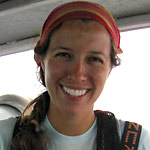Abigail Lynch is a research scientist at the National Climate Change and Wildlife Science Center at the U.S. Geological Survey. She earned her doctorate at the Michigan State University Department of Fisheries and Wildlife for her dissertation titled: “Designing a decision-support tool for harvest management of Great Lakes lake whitefish (Coregonus clupeaformis) in a changing climate,” and received a doctoral specialization in Environmental Science and Policy. She received her M.S. in marine science from the Virginia Institute of Marine Science, College of William and Mary, for her thesis research titled: “A molecular analysis of Atlantic menhaden (Brevoortia tyrannus) stock structure.” She was then awarded a one-year John A. Knauss Marine Policy Fellowship with the U.S. Fish & Wildlife Service’s Fisheries Program headquarters office. She holds a B.S. in biology and B.A. in English from the University of Virginia.
Dr. Abigail Lynch has always found fish fascinating, but it wasn’t until a study abroad trip to the tiny remote island of San Salvador in the Bahamas that she really got hooked on science. On the trip, she had to develop her own research project, and she chose to study the behavioral response of a particular species of fish to the shape of predators and other competitors. Lynch enjoyed designing and implementing her own project so immensely that when she returned to the United States, she undertook an undergraduate research project in fish biology.
Today, as a research fisheries biologist for the U.S. Geological Survey (USGS), Lynch provides scientific information to policy makers, resource managers, and the public to support science-informed decisions about the management of lands and natural resources. On the management- and policy-oriented direction her career has taken, she reflects, “I find scientific inquiry interesting, but I am more fulfilled by having research that’s applied. …. Within the framework of the federal agency, all of our research is conducted for the public good, and it’s important for us to provide science to inform policymaking.”
The "four Fs of fish"
Lynch got involved in fisheries work because she thought fish were remarkable animals, but has stayed because she came to believe they are integral parts of our ecosystems. In a recent editorial, she described this importance as the “four Fs of fish”: food, fun, financial impact, and function.
Many of Lynch's research projects—which have brought her to many different locales, including the remote wilderness of Alaska—illustrate the interrelationships between fish and the larger ecosystem. In one project, for example, she looked at how localized depletion of Atlantic menhaden, a small fish that serves as food for larger fish such as striped bass, might be caused by commercial fishing.
In another project, for her doctoral research, she studied commercial fishing of whitefish in the Great Lakes. Whitefish, which have been fished in that area for millennia, are important not only ecologically but also culturally and economically. Some work had been done on the effect of climate variability (e.g. ice cover and water temperature) on whitefish recruitment (i.e. when young fish reach a certain size or reproductive stage), and Lynch went a step further by investigating how climate change would potentially affect recruitment. She found that climatic variables affected recruitment in different ways in different locations—for example, greater wind speeds brought recruitment down in some areas but not others. She acknowledges, “There are other factors [besides science] that will be important for actually determining harvest quotas,” but she hopes her research will inform management strategies for these fisheries.
At the USGS, Lynch is part of a team looking at the ecological impacts of drought. One of the projects examines the implications of changes in the "green wave"—the leading edge of vegetation greening up in the spring that wildlife rely upon for key nutrients—brought by drought and climate change. Of her work today, Lynch notes that it is driven by the needs of decision makers to determine policy: “Everything that I do and all the science done within the agency is designed to inform management, particularly the Department of the Interior.”
Science in service to the public
Lynch recognizes the challenges some scientists face in working to provide information for decision makers and the public. She notes that within the scientific community there are individuals who shy away from this kind of work because they worry that it will tarnish their objectivity.
She approaches the connection between science and policy in a different way, as an opportunity to help provide objective science to decision makers so that policy and management is grounded in science. “I think that it’s important for us to provide science-based information to others who may not be in the same informed position to help them make better decisions,” she explains, “That’s not advocacy, that’s a public service.”
Lynch is devoted to public service outside of her career as well. She has written editorial pieces communicating the importance of fish to the public, including “The Four Fs of Fish: Communicating the Public Value of Fish and Fisheries” and “One Fish, Two Fish, Where Fish for Whitefish?” She has also won an award from the American Fisheries Society for excellence in the communication of fisheries research to the general public.
“I really enjoy being in science,” Lynch reflects, “because of the discovery aspect of it.” Ultimately, though, she feels most strongly about her ability as a scientist to contribute to society and the policies that shape it: “The work that I do is fulfilling and important because of the application aspect. I think nature and fish and habitats are very interesting, but I am almost more excited by the fact that I will be helping people and decision-making processes by providing this objective information.”
